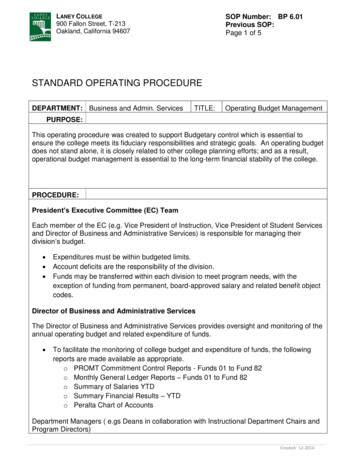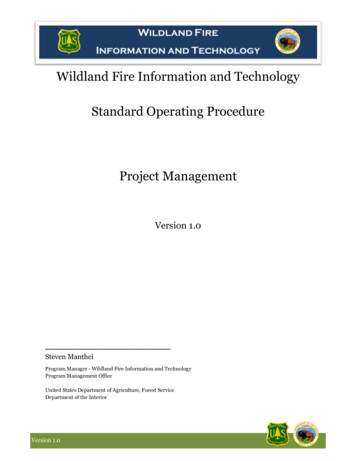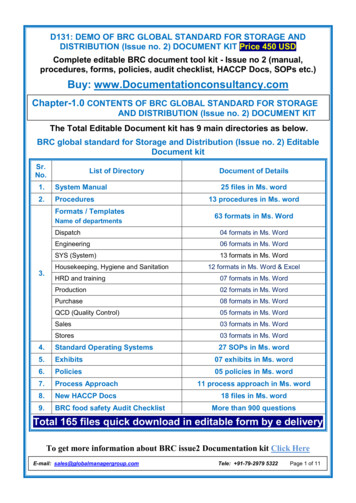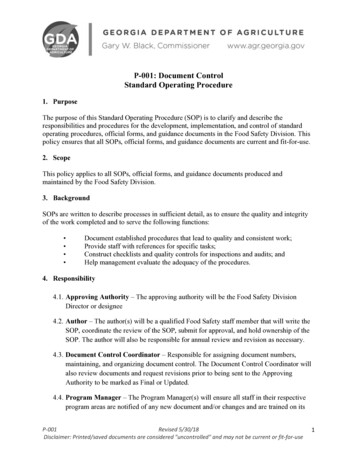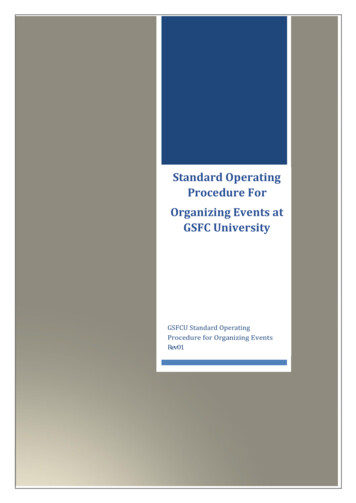
Transcription
Standard OperatingProcedure ForOrganizing Events atGSFC UniversityGSFCU Standard OperatingProcedure for Organizing EventsRev01
Revision DetailsGSFCU- Standard Operating Procedure forOrganizing Events at GSFC University Rev01Revision01Date19-06-2019ReasonAuthorAparajita JhaPage 1 of 9
Table of ContentsContents1. Development of Objectives . 32. Pre-Event Activities.3-62.1 In Principle Approval . 32.2 Team Formation . 32.3 Determine the Theme for Event . 32.4 Budget Establishment . 42.5 Determine Venue/Location . 42.6 Setting up an Event Date . 52.7 Advertising & Promotion . 52.8 Identify and Establish Partnerships & Sponsors. 52.9 Plan menu for Meals and Refreshments . 52.10 Create a Communications Plan . 63. Activities During the Event. 64. Post-Event activities . 64.1 Post-event Advertising Activities . 64.2 Comprehensive Report . 65. Annexure: I Checklist .7-9Page 2 of 9
1. Development of ObjectivesWith a view to streamline the set of procedures required to conduct various activitieslike workshop/conferences/seminar/convocation, it is necessary to devise the StandardOperating Procedures (SOP). SOP is a simple mechanism where it guides the performerto do the assigned tasks in a better way to achieve quality through continuousimprovement. It is therefore necessary for SOP to contain a set of principles ofinstructions, directions, and other information as it is required to complete the taskssuccessfully.The Entire event management activities at GSFC University can be appropriately dividedinto three categories namely Pre Event Activities, During the Event Activities & PostEvent Activities.2. Pre-Event Activities2.1 In Principal ApprovalThe Event Manager should seek in- principal approval to conduct the event fromauthorized personnel (President).2.2 Team FormationA special event takes a concerted team effort to handle all of the details. Hence a teamcomprising of active members from the university should be formed headed by Provost,depending on the type of event. An event manager and other members should bedeployed with responsibilities on the following subcommittees, such as: Core-Committee – would be responsible for Budget, Event approval,Strategic Planning, Overall Monitoring, Wrap-Up, Feedback, Documentation Venue Management Team - logistics, Transportation, Parking, VIP Guestarrangement, & catering management. Guest management Team (invitations, RSVPs, greeters, registration, seatingarrangements, etc.) Speakers/presenters Management Team - (selecting, confirming, logistics,management, etc.) Activities/entertainment Team Publicity/promotion Team (Web presence, events calendars, printedprograms, media relations, signage, social media, etc. Sponsor/partnermanagement)2.3 Determining the Theme of the EventChoosing a timely and compelling theme to complement event objectives is imperativeto decide the theme a brainstorming session is needed, where we need to think about.How is this event different from the other events? What are we hoping to convey through this event? What name would attract the most attention and be most memorable? As short a name as possible will be easiest to communicate.Page 3 of 9
2.4 Budget EstablishmentA compressive budget, listing all expenses for all functional areas of event, anddetermining which expenses will be assumed by the host, potential sponsors, and/or bythe attendees (fee) needs to be worked out.Budget items to consider while establishing the budget: Participation KitMarketing expensesBranding ExpensesTransportationVenue fees (If some other Venue to be Decided other than GSFC-U)Guest accommodations (if applicable)Food and beverageEntertainment and recreationAudio visual equipmentSecurityContingency fund for unanticipated, last minute expensesSource of Income (Participation Fees & Sponsorship& Partnership)2.5 Determine Venue/LocationWhen determining the location for the event, the following points needs to beconsidered:The Capacity size of the venue to accommodate the guest and the TargetAudienceConsidering weather, especially if considering an outdoor venue.Security (needed? If so, how much and for how long?)Be sure to build in ample set-up and clean-up timeParking availability (including designated parking for Trustees and other VIPs).Audiovisual needs, Consider the following potential A/V needs. Sound system Projector Screen (be sure to understand screen size – square or rectangle – inorder to prepare PowerPoint presentation in appropriate 16:9 or 4:3format) Microphone (podium mic, standing mic, handheld, collar mic, etc.) Internet connection (for accessing YouTube or other online content) Laptop (provided by facility vs. bring your own to connect to theirsystem)Consider other potential facility needs as well: Podiums Conference Speaker Name Plates Extension cords Photography VideographyPage 4 of 9
Accommodation of guests: If the event involves out-of-town guests, travel time andcost to reach a destination, cost of accommodation of the guest other miscellaneousexpenditures etc. to be taken care.2.6 Setting up an Event DateThe Following Points needs to be considered while setting up the date of the event: Checking the Academic Calendar and seeking permission from therespective department headChecking availability with key participants- e.g., speakers, presenters,VIP guests, etc.Checking the statutory and religious holidays.2.7 Advertising & PromotionAdequate publicity and promotional items needs to be designed and printed whereverapplicable (e.g., Invitations, Web page, Brochure, Standees, Banners, Flyers, Giveawayitems, adequate visibility of the sponsor logo, name etc.). Developing a consistent set ofmaterials with overall look and feel of the event (invitation, Web page, PowerPointtemplate, posters, directional signage, etc.) should be developed.2.8 Identify and Establish Partnerships & SponsorsSeeking corporate sponsors and partners, to fund a portion of the event. The partnershipcould defray the costs and increase potential participation. The partnership &sponsorship can range from small scale to large scale Industries.2.9 Plan Menu for Meals and Refreshments Plans refreshments to fit with the nature of the event, wherepossible Ensuring enough time for guests to eat leisurely, network, orsocialize with colleagues and friends Time allocation for refreshment: 20 minutes for morningsnacks, 60 minutes for luncheon & 15 minutes for high tea,applicable as per the event. Timing Variation to be incorporatedas per the size of the audience Ensure an adequate supply of water for guests & participants. 2.10 Create a Communications PlanA strong communication strategy is imperative for effective execution of an Event. Evenwith the most amazing speaker or the theme, a strong communication strategy is neededto promote the event to get people in the door. Event promotion may include: Invitations Web site story and/or banner Newsletter Email announcement(s)Page 5 of 9
Flyers/posters Direct mail Social media (Facebook, Twitter, LinkedIn, Instagram, YouTube, blogs.)3. Activities during the Event:On the day of event Confirm Media attending , Ensure all signage is in place, Ensureregistration and media tables are prepared and stocked with necessary items a)Participation Kit( Note Pad, Pencil, Paper, badges), Ensure all promotional items, gifts,memento, etc. are on-site, Ensure catering Services, Ensure Security and Parking. GuestIntroduction by anchor and other facilitation by committee GSFCU.4. Post-Event Activities:The event should be duly completed with a post-event thank-you messages to speakerssponsor, media and ensuring adequate media coverage in both the Electronic, E media,print Media. Creating materials for the media as appropriate, including selective photos,videos, press release detailing the outcome(s) of the event.4.1 Post-event Advertising ActivitiesInclude post-event stories and photos in: Web page(s) Newsletters Blog posts Post videos and/or speaker presentation on your Web siteand/or social media Update your event page to include information on the event’ssuccess adding testimonial of the participants, guest, speakersetc. Collect information through RSVPs or other means.4.1 Comprehensive ReportA Comprehensive report to be prepared and the report to be submitted to the GSFCUniversity management and then create a repository at the library.Page 6 of 9
5. Annexure: I ChecklistSr. No.123456789TASK LIST PRE EVENT -ONE MONTH BEFORERESPONSIBLE PERSONEstablish event objectives/Theme/ In PrincipalApproval from top ManagementRecruit event committeeSelect dateChecking availability :Academic Calendarkey participants- e.g. Speakers, presenters, VIPguests, etc.Checking the statutory and religious holidays.Identify venueThings to consider when booking an event include:A.How many people are you expecting?B. Security If Needed?C. Parking Availability?D. Where you will set up a registration desk?E. Do you need any additional furniture?Audiovisual needsA. Sound systemProjectorScreenD. Microphone (mic, standing mic, handheld,collar mic, etc.)E. Internet connection (for accessing YouTube orother online content)F. Laptop (provided by facility vs. bring your ownto connect to their systemPotential facilityA. PodiumsB. Conference Speaker NameplatesC. Extension cordsD. PhotographyE. VideographyAccommodation of outstation guestFinalization of the theme of the EventSpeaker/Presenter Liaison:A. Finalize presentation/speech topicsB. Request bio information, photoC. Make travel and accommodation arrangementsPage 7 of 9
Sr.No101112131415TASK LIST PRE EVENT -ONE MONTH BEFORERESPONSIBLEPERSONCommunications Plan:A. Request logos from corporate sponsors for printingDevelop draft programCreate draft event script (speaker introductions, thanks,closing, etc.)D. Develop media list /release, backgrounder, and mediakit materials (e.g., speaker info, photos, etc.)E. Create event page on website, Facebook, LinkedIn andother social media and create a promotional Video forYouTubeCatering to be ProvidedTo provide catering within the university premises,contact the Campus Facility Manager. Approval to hireexternal contractors for cateringTASK LIST PRE EVENT- ONE WEEK BEFORESend reminders to contact list erA. Confirm travel/accommodation detailsB. Request copy of speeches and/or presentationsSponsorship: Follow up to confirm sponsorships andunderwritingSchedule a meeting for all committeeA.Brief any/all hosts, greeters, volunteers about theirevent duties and timelinesB. Final seating planC. Make print and online copies of any speeches, videos,presentations, etc., or any other requirement by thespeakersD. Finalizing who would be anchoring5.Who Would be extending vote of thanksTASK LIST- ON THE EVENT DAY16A. Confirm Media attendingB. Ensure all signage is in placeC. Ensure registration and media tables are preparedand stocked with necessary itemsa) Participation Kit( Note Pad, Pencil, Paper, badges),b) Ensure all promotional items, gifts, memento, etc. areon-site.D. Guest IntroductionE. Ensure catering ServicesF. SecurityG. ParkingPage 8 of 9
POST EVENT- ACTIVITIES17Conduct a Post-Event Survey – to learn what peopleenjoyed about your event, and where you have room toimproveA. Conduct a post-event meeting and thorough evaluationof objectives vs. outcomesB. thank attendees for participating Send thank-you letters to:A. SponsorsB. VolunteersC. Speakers/presentersD. DonorsE. MediaF. Ensuring appropriate Media coverage Feedback, Suggestion for Improvement,Documentation, Repository CreationPage 9 of 9
Page 10 of 9
The Entire event management activities at GSFC University can be appropriately divided into three categories namely Pre Event Activities, During the Event Activities & Post Event Activities. 2. Pre-Event Activities 2.1 In Principal Approval The Event Manager should seek in- principal approval to conduct the event from







